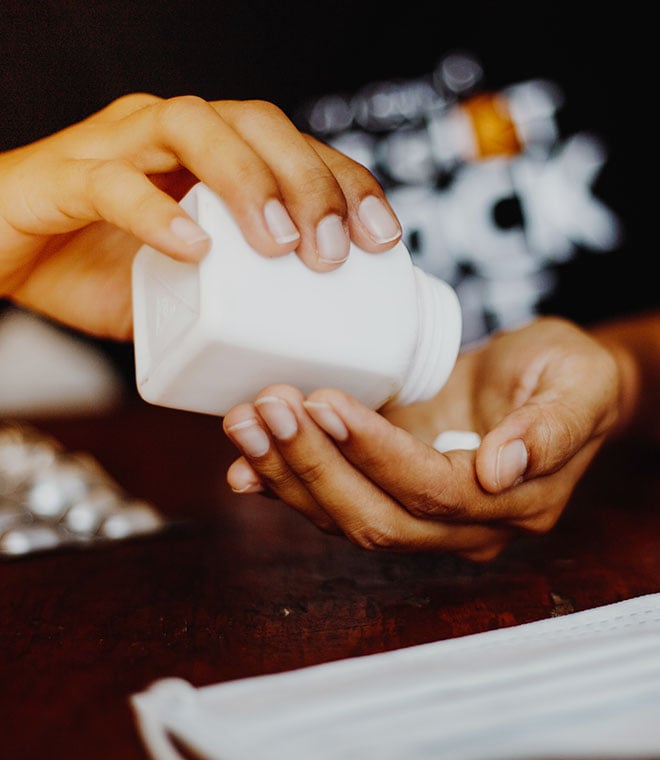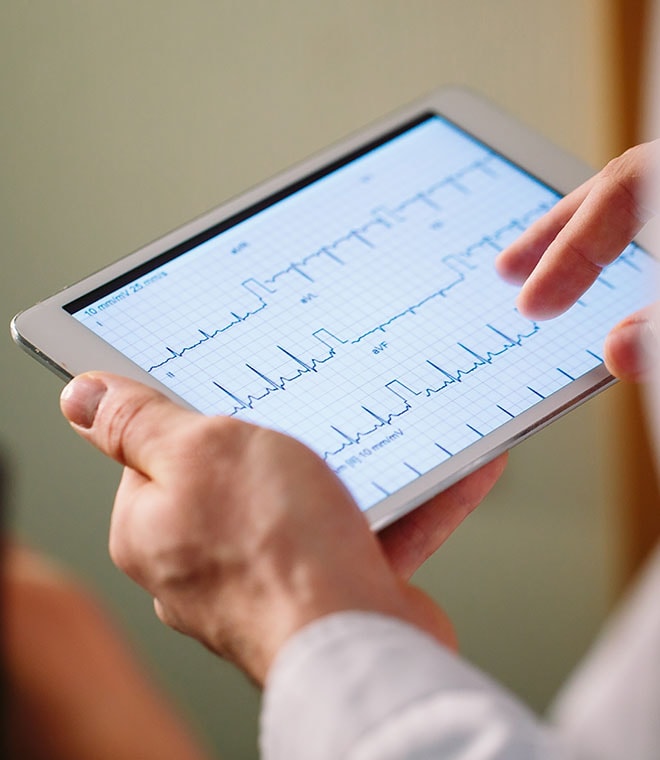Health
Heart arrhythmias: Causes and treatments
By Keyur Mavani, MD, Fellow of the American College of Cardiology, FACP Aug 02, 2023 • 11 min
People often discuss arrhythmia as if it were a single type of heart condition. In reality, there are several types of heart arrhythmias. Each type has distinct features, causes and treatments.
Atrial fibrillation
When the upper chambers (atria) of the heart beat irregularly in a way that’s faster than the lower chambers (ventricles), healthcare providers refer to the arrhythmia as atrial fibrillation, or A-fib. This condition occurs due to dysfunction in the way electrical signals travel through the atria of the heart. It’s believed that atrial fibrillation occurs due to electrical discharges within one of the pulmonary veins. Common causes include:
- Coronary artery disease
- Damage or scarring due to a heart attack or previous heart surgery
- Congenital heart defects
- Problems with the heart valves
- Hypertension
- Lung disease
- Stress on the body caused by a serious illness or surgery
- Sleep apnea
- Thyroid disease
- Stimulants such as tobacco, caffeine and certain medications
- Viruses
Treatment for A-fib involves resetting the heart rhythm and controlling the heart rate. Healthcare providers may prescribe beta blockers, calcium channel blockers, digoxin or other antiarrhythmic medications for people with atrial fibrillation. In addition, blood thinners may be used to reduce the risk of blood clots and stroke, which are potential complications of A-fib.
In some cases, healthcare providers may recommend other interventions, such as electrical cardioversion, a therapy that resets heart rhythm by electrically stimulating and resetting the heart with paddles or electrodes. When medication and other interventions aren’t successful at treating A-fib, a surgical procedure known as cardiac/A-fib ablation may be necessary. Cardiac/A-fib ablation is when a medical provider, such as a surgeon or an electrophysiologist, intentionally creates scar tissue in the heart with heat or cold to stop abnormal electrical signal transmission.
Atrial flutter
Like A-fib, atrial flutter is a type of arrhythmia related to irregularities in electrical conduction through the upper chambers of the heart. Atrial flutter happens when the atria beat at a much faster-than-usual rate of 250 to 350 beats per minute. In some cases, the two chambers beat at different rates.
Healthcare providers aren’t always able to determine the specific cause of atrial flutter. Some potential causes may include:
- Uncontrolled high blood pressure
- Alcohol abuse
- Hyperthyroidism
- Heart valve disorders
- Coronary artery disease
Potential treatments for atrial flutter include the same medications, therapies and surgical procedures used to treat A-fib.
Bradyarrhythmia
Not all arrhythmias involve an accelerated heart rate. In the case of bradyarrhythmia, the problem is a heart rate that’s too slow. At rest, a person with bradyarrhythmia has an irregular heart rate that’s below 60 beats per minute. Common causes of bradyarrhythmia include:
- Age-related changes in the heart’s conduction system
- Hypothyroidism
- Coronary artery disease
- Congenital heart defects
- Injury to the heart due to a heart attack, surgery or accident
- Beta blockers and some other heart medications
Treatment for bradyarrhythmia often involves addressing the underlying condition that caused the arrhythmia. For example, a person with hypothyroidism may take medications to increase thyroid hormone levels, or an individual taking a medication that causes bradyarrhythmia may change to a different drug. When bradyarrhythmia arises due to age-related changes in the heart, healthcare providers may surgically implant a pacemaker, a device that produces electrical impulses to promote a steady heartbeat.
Conduction disorders
Sometimes referred to as “heart block,” conduction disorders are arrhythmias that occur due to improper production of electrical signals or the inability of electrical signals to travel through the heart in a normal way. There are several types of conduction disorders, including:
- Sick sinus syndrome (SSS): A conduction disorder caused by dysfunction of the SA/sinoatrial node that controls heart rhythm
- Atrioventricular (AV) block: A conduction disorder that occurs when few or no electrical signals reach the ventricles or lower chambers of the heart
- Bundle branch blocks: A conduction disorder that occurs when electrical signals travel more slowly through one side of the heart, causing the ventricles to contract at different times
- Ion channel disorders: Conduction disorders that occur due to problems with tiny pores in heart muscle cells, known as ion channels
Some causes of conduction disorders include:
- Genetic disorders
- Cardiovascular disease, such as coronary artery disease
- Autoimmune diseases
- Excessively high or low electrolyte levels
- Muscular dystrophy
- Sleep apnea
- Thyroid disease
- Some medications used to treat high blood pressure, heart conditions and mental illnesses
To treat conduction disorders, healthcare providers may prescribe medicine to increase or decrease the heart rate. A pacemaker may also be necessary.
Supraventricular tachycardia
Commonly referred to as SVT, supraventricular tachycardia is when the upper chambers beat too quickly and/or erratically, usually for a short period of time. Common causes of an SVT episode include:
- Exercise
- Lack of sleep
- Heart disease
- Heart failure
- Lung disease
- Excessive intake of caffeine or alcohol
- Recreational drugs such as methamphetamine and cocaine
- Smoking
- Thyroid disease
- Pregnancy
- Some medications used to alleviate cold symptoms and treat asthma and allergies
For many people, SVT doesn’t require treatment. However, healthcare providers may recommend treatments when SVT episodes occur frequently or persist for long periods of time.
Treatments for SVT may include antiarrhythmic medications, cardioversion, a pacemaker or ablation surgery. Healthcare providers may also perform carotid sinus massage, a technique that involves placing pressure on the neck to slow down heart rate.
Vagal maneuvers are another potential treatment for SVT. These are physical actions that a healthcare provider may instruct you to do in order to stimulate the vagus nerve, which helps to control heart rate.
Ventricular fibrillation
A life-threatening form of arrhythmia, ventricular fibrillation, or V-fib, is when the two lower chambers of the heart contract too quickly and in an uncoordinated way. The lower chambers/ventricles beat rapidly, leading to very little output from the heart. This can deprive the rest of the body of blood, causing complications, including death.
Causes of V-fib include:
- Heart attack
- Heart muscle disease
- Congenital heart defects
- Damage to the heart muscle due to an accident like an electrocution
- Recreational drugs such as methamphetamine and cocaine
- Severe electrolyte imbalances
Emergency treatment for V-fib may involve cardiopulmonary resuscitation (CPR) and the use of an automated external defibrillator (AED) to promote a normal heart rhythm. To control the condition going forward, healthcare providers may prescribe antiarrhythmic medications, implant a defibrillator to control the heart or perform cardiac ablation.
In some cases, healthcare providers may recommend other surgical procedures. When V-fib occurs due to a heart attack, a surgeon may perform a coronary angioplasty and stent placement. This procedure involves widening a blocked artery and then inserting a metal mesh stent to restore blood flow.
For V-fib that arises due to coronary artery disease, coronary bypass surgery may be necessary. During this procedure, a surgeon creates a new pathway around a blockage to allow blood to flow freely through the heart.
Ventricular tachycardia
Also known as V-tach or VT, ventricular tachycardia occurs when the lower chambers of the heart beat too quickly due to faulty electrical signals. Causes of VT include:
- Damage or scarring due to a heart attack or heart disease
- Coronary artery disease
- Congenital heart defects
- Electrolyte imbalances
- Recreational drugs such as methamphetamine and cocaine
Like V-fib, V-tach can be fatal if it lasts for longer than 30 seconds. Emergency treatments such as CPR and defibrillation with an AED (automated external defibrillator) may be necessary to prevent death due to sustained V-tach.
Once someone with ventricular tachycardia is stable, healthcare providers may recommend treatments such as antiarrhythmic medications, cardioversion, a pacemaker or defibrillator, ablation surgery or open heart surgery.
Understanding your treatment options
If you’ve been diagnosed with arrhythmia, the best treatments for you will depend on factors such as the type of arrhythmia, the severity of your symptoms, the cause of your symptoms, and your medical history and age. Work with your healthcare provider in order to identify what led to your arrhythmia and develop a treatment plan to address symptoms and support your heart health.
Updated August 2023.
Sources:
- https://www.mayoclinic.org/diseases-conditions/atrial-fibrillation/symptoms-causes/syc-20350624
- https://www.heart.org/en/health-topics/atrial-fibrillation/what-is-atrial-fibrillation-afib-or-af/atrial-flutter
- https://my.clevelandclinic.org/health/diseases/23349-bradyarrhythmia
- https://www.nhlbi.nih.gov/health/conduction-disorders
- https://www.hopkinsmedicine.org/health/conditions-and-diseases/sick-sinus-syndrome
- https://www.mayoclinic.org/diseases-conditions/supraventricular-tachycardia/symptoms-causes/syc-20355243
- https://my.clevelandclinic.org/health/treatments/22227-vagal-maneuvers
- https://www.mayoclinic.org/diseases-conditions/ventricular-fibrillation/symptoms-causes/syc-20364523
- https://www.mayoclinic.org/diseases-conditions/ventricular-tachycardia/symptoms-causes/syc-20355138
- https://www.uptodate.com/contents/catheter-ablation-for-the-treatment-of-atrial-fibrillation-technical-considerations-for-non-electrophysiologists
- https://www.heart.org/en/health-topics/atrial-fibrillation/what-is-atrial-fibrillation-afib-or-af/atrial-flutter
- https://www.heart.org/en/health-topics/arrhythmia/about-arrhythmia/bradycardia--slow-heart-rate
- https://www.heart.org/en/health-topics/arrhythmia/about-arrhythmia/ventricular-fibrillation
- https://www.mayoclinic.org/diseases-conditions/ventricular-fibrillation/diagnosis-treatment/drc-20364524
- https://www.mayoclinic.org/diseases-conditions/ventricular-tachycardia/diagnosis-treatment/drc-20355144



